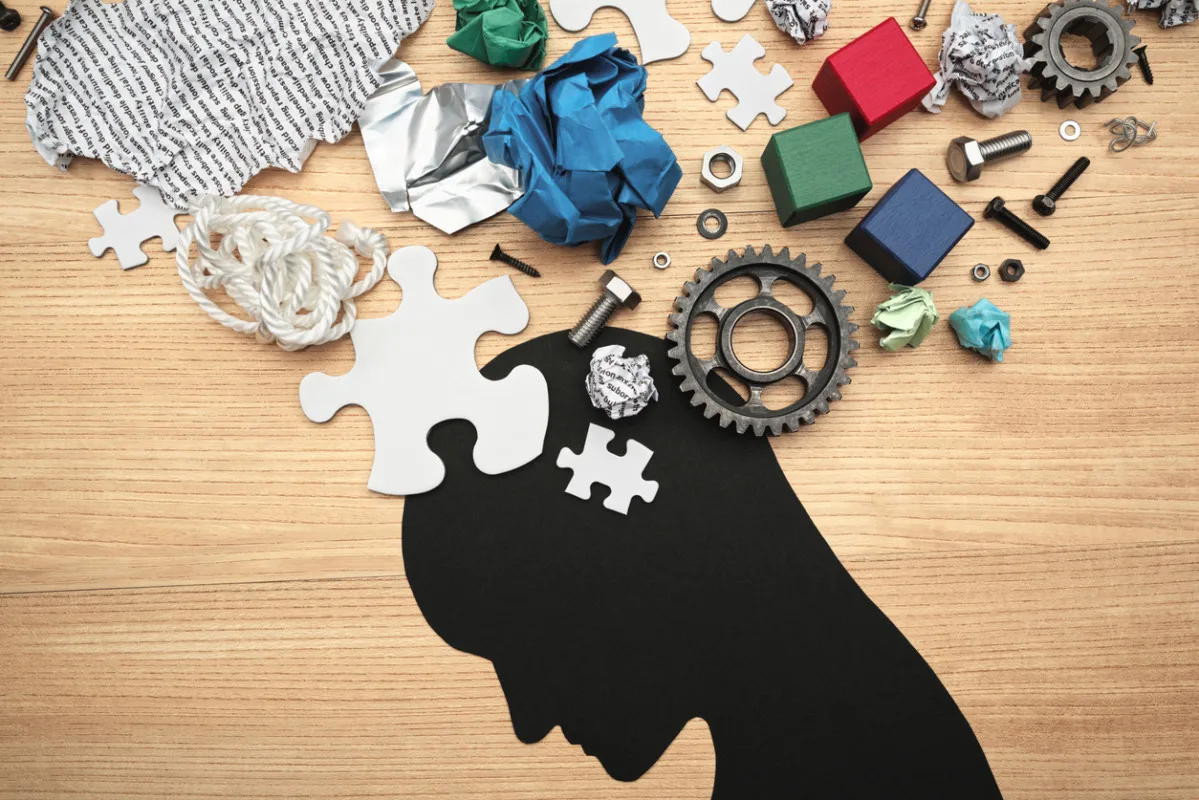Depiction of dementia
Are your earbuds always blaring your favorite hype music every time you go for a run? Do you have a habit of cleaning your ears with cotton swabs? Is your work environment really loud? If all this sounds familiar, you could be damaging your hearing—and that, in turn, could put you at a higher risk for dementia later in life.
Protecting your hearing is crucial, but what’s even more important is recognizing the early signs of hearing loss and getting treated. A 2023 study published in the Journal of the American Medical Association found that older adults who had untreated hearing loss have a more than 60% higher prevalence of dementia, but those who wore hearing aids were able to lower their risk.
“We are not sure exactly why untreated hearing loss is linked to dementia, but it is a risk factor,” says Jessica Caldwell, Ph.D., director of the Women’s Alzheimer’s Movement Prevention Center at the Cleveland Clinic Lou Ruvo Center for Brain Health.
Not only is it a risk factor, but Caldwell says hearing loss, when left untreated, could have effects “even after memory problems or dementia begin,” and may speed up the cognitive decline for people who have dementia.
Wondering about the signs of hearing loss and when you should get your hearing checked? Parade asked experts to explain how to protect your hearing health and how hearing loss could affect your dementia risk.
The Relationship Between Dementia and Hearing Loss
While experts don’t fully understand the connection between hearing loss and dementia, there is a “clear association,” says Dr. Dale Bredesen, MD, the Singleton Chair in Neurology at the Pacific Neuroscience Institute.
Related: The Number of Hours Spent Sitting That May Increase Dementia Risk by 63%
One reason could be that whatever is causing a neurodegenerative disease, like Alzheimer’s or Parkinson’s, could also cause damage to sensory systems like hearing, smell or vision, Dr. Bredesen explains.
Another could be that hearing loss causes people to stop socializing or retreat from learning activities that involve listening, Caldwell says. Research shows that reduced social interactions and isolation can increase someone’s risk for dementia.
Yet another connection is that brain stimulation increases nerve growth factor support, including the brain-derived neurotrophic factor (BDNF), a protein that plays a role in nerve cell support and growth. Reductions in BDNF, because of hearing or vision loss, may increase the risk of cognitive decline, Dr. Bredesen says.
In other words, “Hearing loss means less sensory input and less stimulation to the brain, and that leads to decline,” Caldwell explains.
Can Protecting Your Hearing Reduce Your Risk for Dementia?
Hearing and vision help you integrate into your environment and understand what’s going on, explains Melissa Heche, AuD, an audiologist and owner of New York Speech and Hearing.
When you start to lose your hearing, you may struggle to understand the world around you and feel more disconnected, she says. The ability to communicate can deteriorate with hearing loss, and communication helps nourish the brain.
“You can see how hearing loss would be an almost perfect storm for the onset of dementia,” Heche shares.
Reduced hearing is also likely to contribute to a more rapid decline when you have dementia, Dr. Bredesen says. “So protecting your hearing is protecting your brain.”
What Are the Early Signs of Hearing Loss?
Sometimes, the signs of hearing loss mirror the early signs of dementia, Heche says. For instance, during a hearing test, people are often asked to repeat what they hear, which might be a struggle for people with dementia.
“Those early dementia signs of forgetfulness may actually be a sign of hearing loss and may not be a soft cognitive sign at all,” she explains.
Hearing loss is common as you get older—about a third of adults over 65 and half over 75 experience some type of hearing loss, according to the Cleveland Clinic.
Here are some signs of hearing loss:
- Ringing in your ears, known as tinnitus
- Feeling pressure in your ears
- Having earaches
- Experiencing balance problems or dizziness
- Needing to turn up the volume on your TV or phone
- Asking people to repeat themselves
- Struggling to follow conversations
- Having trouble hearing high-pitched sounds
When to Get Your Hearing Tested
If you work in construction, entertainment or another industry where you’re constantly around loud noises, Heche recommends getting your hearing tested every year. This will help you recognize any changes in your hearing.
Otherwise, you need at least one hearing test as an adult before the age of 60. But, Heche recommends having your hearing checked during your annual physicals. These tests will become a baseline test. Later, if you experience hearing loss, an audiologist can compare your hearing to the baseline to better understand how severe your hearing loss is, according to Johns Hopkins Medicine.
If you experience any signs of hearing loss, like pain, pressure or ringing in your ears, Heche says to get tested right away.
When you’re found to have hearing loss, Caldwell says to follow all recommended treatments. “If your doctor recommends a hearing aid—use it. This is a way that you can reduce dementia risk.”
How to Protect Your Hearing at Any Age
Some age-related hearing loss may be inevitable, but there are ways to protect your hearing throughout your life.
First, if you’re attending a concert, riding a motorcycle, mowing the lawn or working in a loud environment, wear earplugs. “Everything is louder than you think,” Heche says.
She recommends filtered earplugs, where you can hear the music or sound around you, but at a softer level so it’s still protecting your hearing.
Other ways to protect your hearing:
- Keep the volume on your earbuds low enough that you can hear people around you talking
- Avoid sticking cotton swabs or anything else in your ear canal
- Stop smoking, which can interfere with circulation and affect hearing
- Exercise regularly to prevent health problems, like diabetes or high blood pressure, which can affect hearing
- Eat a healthy diet—some vitamin and mineral deficiencies, such as vitamin B12, C, D, E, and magnesium, can contribute to hearing loss
Pay attention to any changes in your hearing, Heche emphasizes. If you notice something, get it checked out.
Next, read about how your personality influences your risk for dementia.
Sources:
- Jessica Caldwell, Ph.D., director of the Women’s Alzheimer’s Movement Prevention Center at the Cleveland Clinic Lou Ruvo Center for Brain Health
- Dale Bredesen, M.D., the Singleton Chair in Neurology at the Pacific Neuroscience Institute
- Melissa Heche, AuD, an audiologist and owner of New York Speech and Hearing
- Hearing Loss and Dementia Prevalence in Older Adults in the US, Journal of the American Medical Association
- Nerve Growth Factor: A Focus on Neuroscience and Therapy, Current Neuropharmacology
- BDNF gene, MedlinePlus
- Hearing Loss, Cleveland Clinic
- Social participation and risk of developing dementia, Nature Aging
Read the original article on Parade













Got a Questions?
Find us on Socials or Contact us and we’ll get back to you as soon as possible.